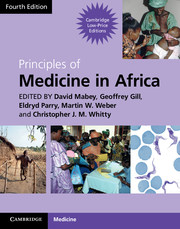Book contents
- Frontmatter
- Contents
- Contributors
- Foreword
- Section 1 Health and disease
- Section 2 Mother and child health
- Section 3 Infection: general principles
- Section 4 Major common infections
- Section 5 Bacterial infections
- Section 6 Viral Infections
- Section 7 Protozoal infections
- Section 8 Helminth infections
- Section 9 Fungal infections
- Section 10 Non-communicable diseases
- Section 11 Diseases of body systems
- Section 12 Cancer and Palliative Care
- Section 13 Venoms and Poisons
- Index
Foreword
Published online by Cambridge University Press: 05 March 2013
- Frontmatter
- Contents
- Contributors
- Foreword
- Section 1 Health and disease
- Section 2 Mother and child health
- Section 3 Infection: general principles
- Section 4 Major common infections
- Section 5 Bacterial infections
- Section 6 Viral Infections
- Section 7 Protozoal infections
- Section 8 Helminth infections
- Section 9 Fungal infections
- Section 10 Non-communicable diseases
- Section 11 Diseases of body systems
- Section 12 Cancer and Palliative Care
- Section 13 Venoms and Poisons
- Index
Summary
Principles of Medicine in Africa is the only medical textbook designed specifically for doctors and medical students working in sub-Saharan Africa. It is written by authors with many years' experience of clinical work in a variety of African countries, and provides a wealth of up-to-date information on the epidemiology, pathogenesis, clinical features, management and prevention of all the important diseases found on the continent. Unlike most medical textbooks, it puts disease and its prevention in the context of society and culture, and is not afraid to address the effects of poverty and inequality on health, as well as the practical issues of how to provide excellent clinical care where resources are limited.
Each disease-specific chapter starts by setting the disease in the context of what is known in Africa, contains highlighted key practice points, and ends with a discussion of unresolved questions needing further research. In addition to covering the classical tropical infectious diseases, the fourth edition contains a comprehensive and up-to-date chapter on HIV/AIDS, major sections on childhood illnesses and non-communicable diseases, and a new and comprehensive chapter on mental health. In Ethiopia, the Task Force for Medical Education has recommended that this new fourth edition should be made available in all medical schools; I believe every medical student and doctor in Africa should have access to it.
- Type
- Chapter
- Information
- Principles of Medicine in Africa , pp. xivPublisher: Cambridge University PressPrint publication year: 2013

